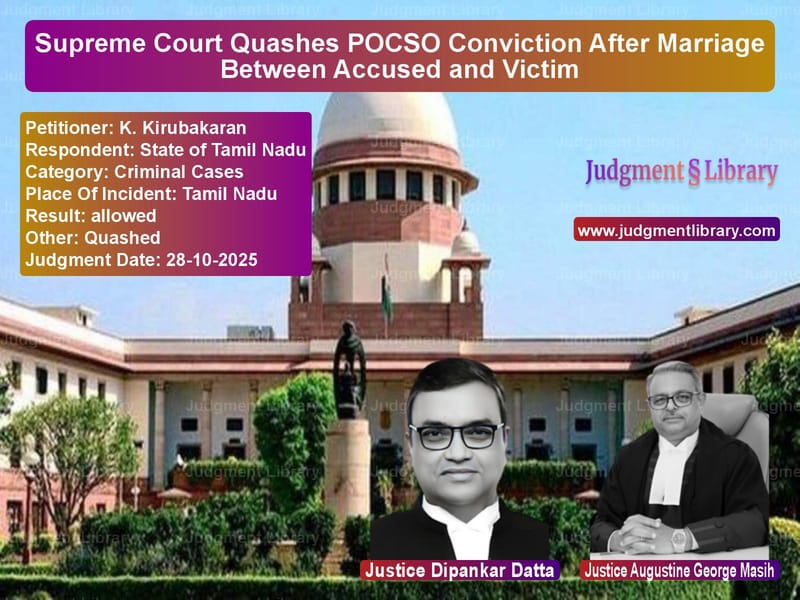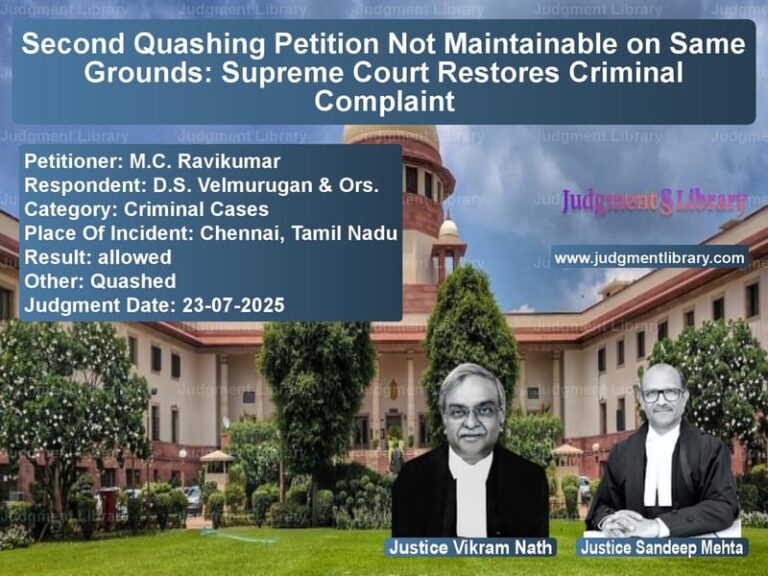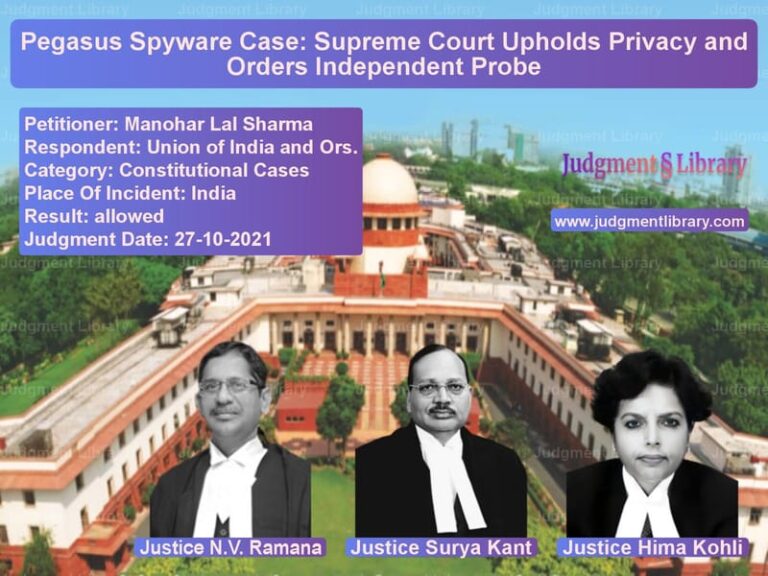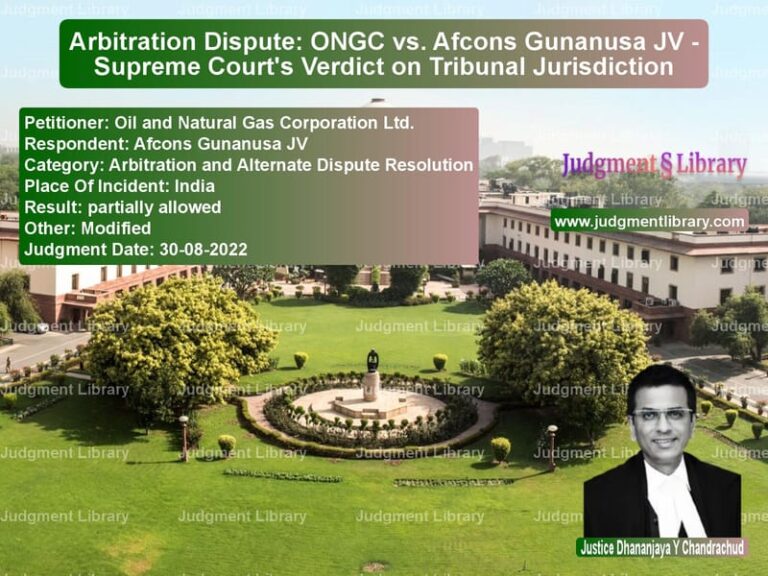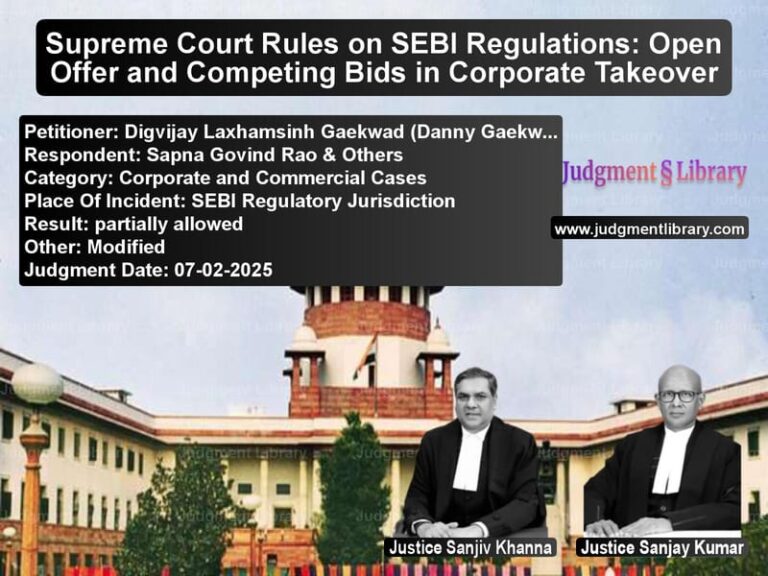Supreme Court Quashes POCSO Conviction After Marriage Between Accused and Victim
In a landmark judgment that balances the strict application of criminal law with the practical realities of human relationships, the Supreme Court of India has invoked its extraordinary constitutional powers to quash the conviction of a man sentenced under the Protection of Children from Sexual Offences (POCSO) Act, after he married the victim and they started a family together. The case of K. Kirubakaran, who was convicted for offences under Section 366 of the Indian Penal Code and Section 6 of the POCSO Act, presents a unique scenario where the Court had to weigh the demands of justice against the welfare of a newly formed family.
The judgment delivered by Justices Dipankar Datta and Augustine George Masih on October 28, 2025, begins with a profound observation: “The final cause of law is the welfare of society.” This quote from former US Supreme Court Justice Benjamin N. Cardozo sets the tone for a decision that recognizes law not as an inflexible instrument of punishment, but as a means to achieve social harmony and human welfare. The Court’s ruling demonstrates how constitutional powers can be exercised to prevent injustice that might result from rigid application of law, especially when unique circumstances demand a more nuanced approach.
The Case Background and Legal Proceedings
K. Kirubakaran was convicted for offences under Section 366 of IPC (kidnapping, abducting or inducing woman to compel her marriage) and Section 6 of POCSO Act (punishment for aggravated penetrative sexual assault) and sentenced to rigorous imprisonment for 5 years and 10 years respectively, along with fine. The conviction was upheld by the Madras High Court through its judgment dated September 13, 2021.
However, during the pendency of the appeal before the High Court, a significant development occurred – the appellant and the victim solemnized their marriage in May 2021. This marital union subsequently resulted in the birth of a male child, who was less than one year old at the time of the Supreme Court hearing.
The Supreme Court, in an earlier order dated February 6, 2024, had directed the Tamil Nadu State Legal Services Authority (TNSLSA) to ascertain the well-being of the appellant’s wife. The report submitted by the Member Secretary of TNSLSA revealed that the couple was leading a happy married life and had been blessed with a child.
The wife of the appellant filed an affidavit before the Supreme Court stating that she was dependent upon the appellant and wished to lead a happy, normal, and peaceful life with him and their child. The Court also interacted with the complainant, who was the father of the victim, through virtual mode. The complainant stated in Tamil that he had no objection to the criminal proceedings being brought to an end.
The Legal Dilemma and Constitutional Question
The central question before the Supreme Court was whether the proceedings should be quashed considering that the appellant was convicted of a heinous offence. The Court acknowledged the serious nature of the dilemma, stating: “We are conscious of the fact that a crime is not merely a wrong against an individual but against society as a whole. When an offence is committed, it wounds the collective conscience of the society and therefore the society, acting through its elected lawmakers, determines what would be the punishment for such an offence and how an offender should be dealt with, to deter its recurrence.”
However, the Court also recognized that “the administration of such law is not divorced from the practical realities. Rendering justice demands a nuanced approach. This Court tailors its decisions to the specifics of each case: with firmness and severity wherever necessary and it is merciful when warranted.”
The Court drew inspiration from Justice Cardozo to hold that “the law aims to ensure not just punishment of the guilty, but also harmony and restoration of the social order.” This perspective guided the Court in balancing the competing interests of justice, deterrence, and rehabilitation.
The Extraordinary Power Under Article 142
The Supreme Court invoked Article 142 of the Constitution of India, which empowers the Court to pass any decree or make any order necessary for doing complete justice in any cause or matter pending before it. The Court described this as an “extraordinary power” conferred by the founding fathers of the Constitution, which “stands apart from all other powers and is intended to avoid situations of injustice being caused by the rigid application of law.”
The Court candidly acknowledged the legal position: “Per the law made by the legislature, the appellant having been found guilty of a heinous offence, the proceedings in the present case on the basis of a compromise between the appellant and his wife cannot be quashed.” However, the Court emphasized that “ignoring the cry of the appellant’s wife for compassion and empathy will not, in our opinion, serve the ends of justice.”
The Court’s Reasoning and Humanitarian Approach
The Supreme Court’s decision was guided by several compelling factors that made this case exceptional. The Court noted that “the appellant and the victim are not only legally married, they are also in their family way.” Most significantly, the Court made a crucial distinction about the nature of the offence: “While considering the offence committed by the appellant punishable under the POCSO Act, we have discerned that the crime was not the result of lust but love.”
The Court gave considerable weight to the victim’s expressed desire “to live a peaceful and stable family life with the appellant, upon whom she is dependent, without the appellant carrying the indelible mark on his forehead of being an offender.”
The Court reasoned that “Continuation of the criminal proceedings and the appellant’s incarceration would only disrupt this familial unit and cause irreparable harm to the victim, the infant child, and the fabric of society itself.”
In a powerful conclusion to its reasoning, the Court stated: “We are, thus, persuaded to hold that this is a case where the law must yield to the cause of justice.”
The Final Order and Conditions
Based on these considerations, the Supreme Court invoked its powers under Article 142 of the Constitution to quash the criminal proceedings against the appellant, including the conviction and sentence.
However, the Court imposed specific conditions to protect the interests of the wife and child. The appellant was directed “not [to desert] his wife and child and also to maintain them for the rest of their life with dignity.” The Court issued a stern warning: “If, in future, there be any default on the appellant’s part and the same is brought to the notice of this Court by his wife or their child or the complainant, the consequences may not be too palatable for the appellant.”
The Court also made absolute the interim order granting the appellant exemption from surrendering and discharged him from bail bonds.
Precedent Value and Broader Implications
The Supreme Court specifically clarified that “this order is rendered in the unique circumstances that have unfolded before us and shall not be treated as a precedent for any other case.” This cautionary note underscores that the decision was based on the peculiar facts of this case and should not be seen as creating a general exception to the application of POCSO Act.
The judgment raises important questions about the intersection of criminal law, constitutional powers, and social realities. While the POCSO Act was enacted with the noble intention of providing stringent protection to children from sexual offences, this case presents a scenario where the victim, now an adult and married to the accused, seeks closure of the case to preserve her family life.
The decision demonstrates the Supreme Court’s role not just as an interpreter of law, but as an institution empowered to ensure complete justice. It highlights how constitutional provisions like Article 142 can be used to prevent injustice in exceptional cases where the strict application of law might lead to outcomes contrary to the welfare of the individuals involved and society at large.
This judgment will likely spark discussions among legal scholars, child rights activists, and women’s rights organizations about the appropriate balance between legal principles and humanitarian considerations in cases involving sexual offences. While some may view it as a necessary exercise of judicial discretion to prevent injustice, others may express concerns about potentially diluting the deterrent effect of special legislation like POCSO Act.
What remains clear is that the Supreme Court has carefully limited the application of this judgment to its unique facts, while reaffirming the principle that the ultimate purpose of law is the welfare of society – a welfare that sometimes requires balancing competing interests in a manner that preserves families and protects the vulnerable, even as it upholds the dignity and authority of the law.
Petitioner Name: K. Kirubakaran.Respondent Name: State of Tamil Nadu.Judgment By: Justice Dipankar Datta, Justice Augustine George Masih.Place Of Incident: Tamil Nadu.Judgment Date: 28-10-2025.Result: allowed.
Don’t miss out on the full details! Download the complete judgment in PDF format below and gain valuable insights instantly!
Download Judgment: k.-kirubakaran-vs-state-of-tamil-nadu-supreme-court-of-india-judgment-dated-28-10-2025.pdf
Directly Download Judgment: Directly download this Judgment
See all petitions in Juvenile Justice
See all petitions in Bail and Anticipatory Bail
See all petitions in Custodial Deaths and Police Misconduct
See all petitions in SC/ST Act Case
See all petitions in Judgment by Dipankar Datta
See all petitions in Judgment by Augustine George Masih
See all petitions in allowed
See all petitions in Quashed
See all petitions in supreme court of India judgments October 2025
See all petitions in 2025 judgments
See all posts in Criminal Cases Category
See all allowed petitions in Criminal Cases Category
See all Dismissed petitions in Criminal Cases Category
See all partially allowed petitions in Criminal Cases Category

